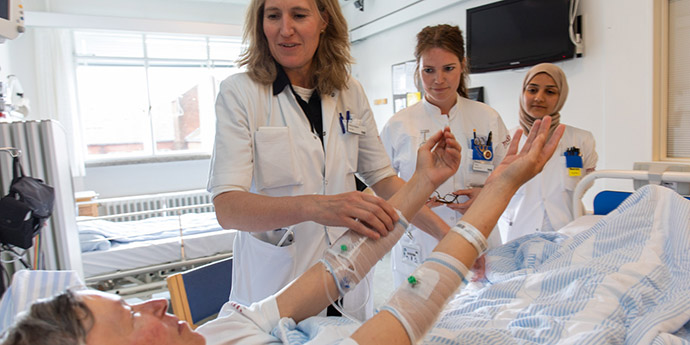
Movement disorders
Movement disorders represent a heterogenous group of neurodegenerative and genetic diseases of the brain with very different clinical presentations challenging the clinician concerning diagnosis and treatment. Advanced neuro-imaging techniques including MRI, MEG, SPECT and PET, neuropsychological, genetic and autonomic testing and Vicon 612 gait analysis system are available for diagnostic procedures. Advanced pharmacological Apomorphine and Duodopa pump treatment of Parkinson’s disease and stereotactical surgical electrode implantation to perform deep brain stimulation (DBS) for Parkinson’s disease, tremor and dystonia have been offered since 1996.
Stroke
Stroke is a leading cause of disability. The Stroke Unit is a specialised and combined acute stroke unit and outpatient transient ischemic attack clinic. A fast multimodal MRI is first choice imaging modality. Key factors for successful treatment are extensive teamwork with pre-hospital service and rehabilitation hospitals and a multidisciplinary approach. We use fast track diagnostics as well as continuously updated and evidence based or experimental treatments in close collaboration with neuroradiologists. Intravenous thrombolysis and/or endovascular treatments are performed in about 300 patients annually.
Neuropathic pain
Neuropathic pain is pain caused by lesions or specific diseases affecting the peripheral and central nervous system. These disorders, which include a series of diseases such as trigeminal neuralgia, nerve lesions, neuropathies, amputations and central pain conditions due to spinal cord injury, stroke, MS etc., represent challenges not only in terms of diagnosis but also in terms of underlying mechanisms and management. We use advanced types of pharmacological and non-pharmacological programmes including implantation of spinal cord stimulators to manage these types of pains. Specific laboratory for sensory examination and autonomic functions is available in the research unit and results here are implemented in the clinical management. All treatments are evidenced based and usually preceded by quantitative sensory testing.
Neuromuscular disorders
Neuromuscular disorders comprise a large group of hereditary and acquired diseases resulting in sensory, motor and autonomic deficits. In a growing number of these disorders treatment has become possible and we use cutting edge treatment modalities such as immune-modulatory therapies and enzyme replacement therapy. Treatments are evidence based and based on close monitoring of neuromuscular function using standardised clinical evaluations and advanced quantitative techniques such as isokinetic dynamometry and MRI.
Multiple sclerosis
The MS clinic at Aarhus University Hospital examines around 6,000 patients per year with the major part being multiple sclerosis (MS) and then to a smaller extent clinically isolated syndrome (CIS), transverse myelitis and neuromyelitis optica (NMO).
Depending on the results of neurological and clinical examinations, various diagnostic tests are performed including cerebrospinal fluid sampling, MRI of the central nervous system, neurophysiological registrations and blood sampling.
Approximately half of the patients finally diagnosed with one of the above diagnoses receive immunomodulatory and immunosuppressive treatment and many more patients receive symptomatic and rehabilitating treatments. We are responsible for the treatment of children with MS, NMOSD and progressive mutifocal leucoencephalopathy (PML) in patients with MS in the western part of Denmark and we have the regional responsibility for lemtrada and intrathecal baclofen treatment
Dementia
Acquired deterioration of cognitive functions is a major cause of neurological disease. Dementia disorders have become more prevalent with increasing average mean age in the general population. However, young onset dementia (onset before age of 65 years) has recently been an increasing focus and improved diagnostic methods, development of new technologies and methods suggest that dementia in the younger population is more prevalent than previously thought.
An active multidisciplinary team in the department undertake the evaluation and treatment of patients with memory problems and possible dementia. There is still no efficient treatment available to cure dementia or to alter its progressive course. However, much can be offered to support and improve the lives of people with dementia and their carers and families. Dementia research has been given top priority in health organisations (WHO).
Epilepsy
The epilepsy diagnosis is based on the description of recurrent unprovoked seizures. The diagnosis is supported by tests, including electroencephalography (EEG), MRI and genetic testing. Treatment with antiepileptic drugs (AEDs) focuses on evidence-based medicine addressing correct treatment and monitoring especially during pregnancy. The epilepsy clinic also works with development of new ways of patient care based on e.g. Patient Reported Outcome (AmbuFlex).